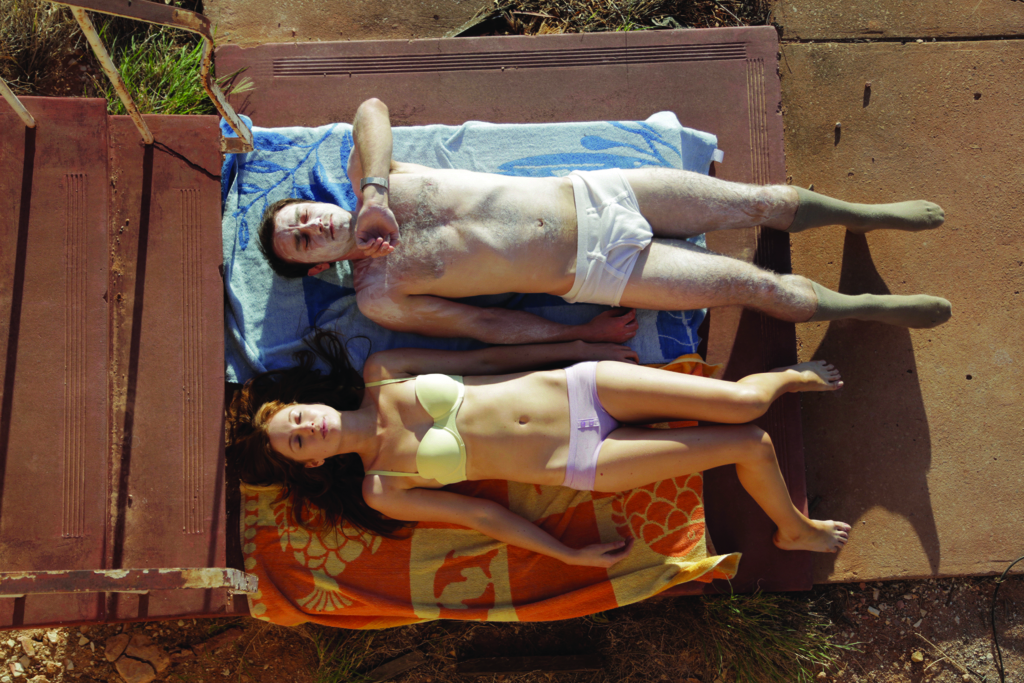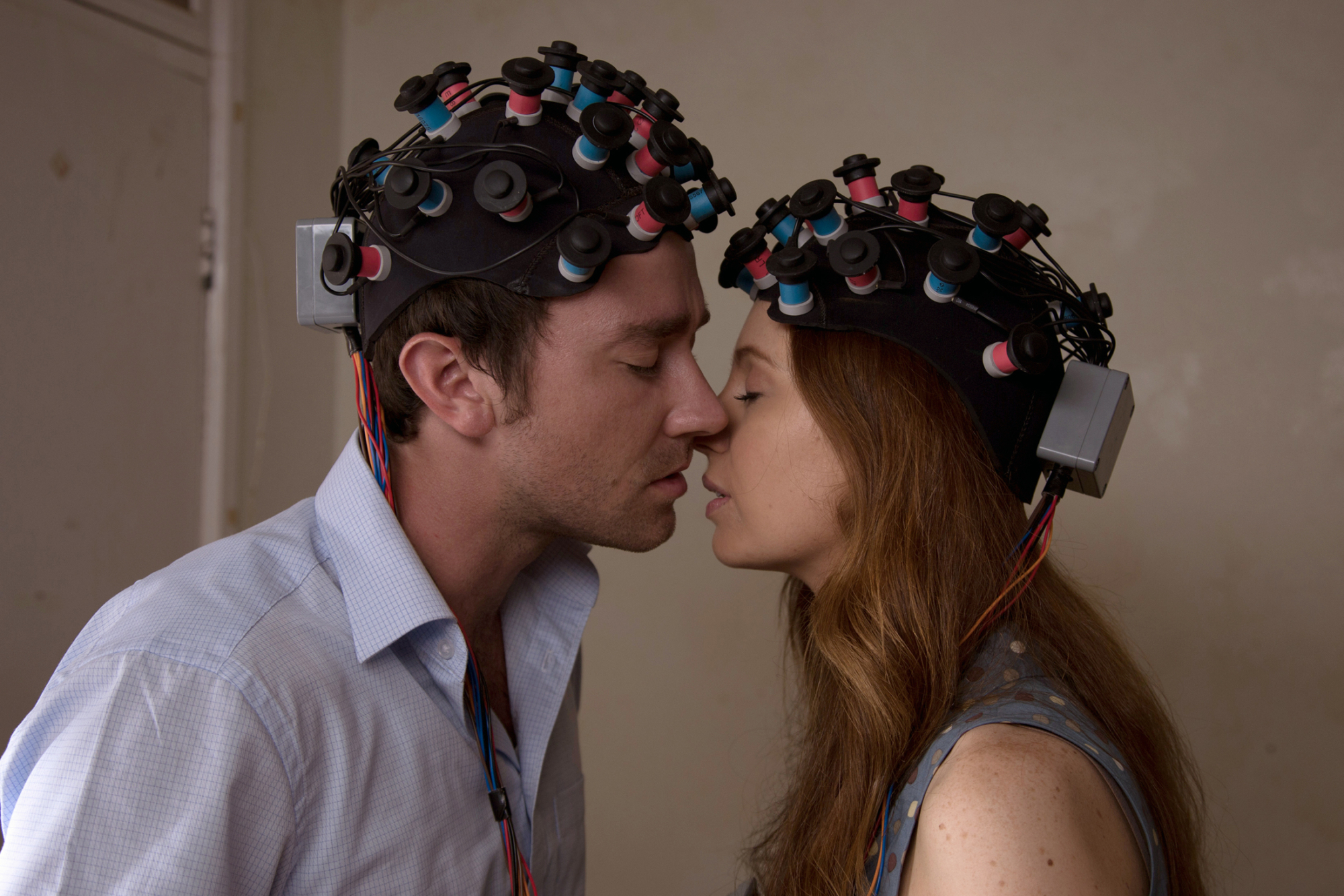Despite their high-concept premises, time-travel comedies are rarely all that cerebral. As far back as Bill & Ted’s Excellent Adventure (Stephen Herek, 1989), the cinematic exploits of time-traveller everymen (quite reasonably) have tended to be played for daft laughs rather than exploring any metaphysical implications. Alternatively, as in recent rom-com About Time (Richard Curtis, 2013), the time travel itself is an almost incidental device, stripped of any science and used as seasoning to reinvigorate an otherwise-tired genre. New Australian film The Infinite Man (Hugh Sullivan, 2014) treads a line between these two camps. It is, at its heart, a romantic comedy, packed with a potent mix of dark and silly jokes, but it thankfully refuses to shy away from the mind-bending possibilities of tangled timelines and paradoxes.
Big ideas, small scale
For all its big ideas, The Infinite Man is a remarkably small-scale production. Featuring (more or less) a single setting and a mere three actors, the film explores an anniversary weekend gone wrong for young lovers Dean (Josh McConville) and Lana (Hannah Marshall). Likewise, its focus is on the personal rather than the universal. Dean is a control freak who has planned every moment of this weekend in intricate detail, intending to re-create a perfect weekend that he and Lana shared a year earlier. Not only has he driven them to the same remote venue, he has also ensured they are each wearing exactly the same clothes they wore the first time around. Already, we have a sense that Dean might have trouble letting things go. Of course, things very quickly go wrong. The motel has closed down (although it’s hard to understand why control freak Dean didn’t book in advance) and Lana’s ex-boyfriend Terry (Alex Dimitriades) turns up, hoping to win her back with his javelin skills (or, failing that, with the threat of his cattle prod). After a brief confrontation, Lana appears to abandon Dean for Terry. But, instead of cutting his losses and returning to civilisation, Dean fires up his time machine and goes back to change his own history.
Writer and director Hugh Sullivan uses this time machine, which appears to be built from old stereo equipment, to explore Dean’s controlling tendencies. Rather than trying to understand what has led his girlfriend to go off with another man, Dean ties himself in knots trying to put things right and get his anniversary back on schedule. As such, he is that classic comedy staple: the ‘idiot genius’ who understands how everything and nothing works. He goes back once, then twice, then a third and fourth time, until there is pretty much one Dean for every room of the motel. With each duplication, the possibilities for comedy multiply. When these return visits also spawn a second version of Lana, things become very complicated indeed. Viewers will likely be untangling conundrums long after the credits roll.
Although Lana is ultimately afforded some agency, the gender politics are distinctly uncomfortable. We know nothing about her other than that she appears to have terrible taste in boyfriends.
Although he revels in mind-bending plotting, Sullivan doesn’t feel the need to dazzle us with technobabble or explanations as to how Dean’s machine works. This is fair enough, as the film has already established this isn’t quite our world. The early scenes have a dreamy, slightly surreal quality that makes it clear we’re in the realm of fantasy. Likewise, the characters are heightened, comic creations whose actions seem driven by the need for a good joke rather than an internal emotional logic. In this absurd – and very funny – universe, we’re happy to believe a dopey science geek can knock together a time machine.

Lana: Love interest
The script does stumble somewhat, however, when it tries to make us invest in these cartoony characters. Indeed, the intricate, recursive plotting necessitates that it takes eighty-five minutes for us to understand the characters’ motivations and, therefore, understand them. In the meantime, both leads appear somewhat unlikeable. In Dean’s case, this is more forgivable, given that he draws on a familiar archetype – the well-meaning nerd who probably belongs somewhere on the autism spectrum. His lover, however, fares less well. Although Lana is ultimately afforded some agency, the gender politics are distinctly uncomfortable. We know nothing about her other than that she appears to have terrible taste in boyfriends. In the opening scenes, she seems so disaffected with Dean that we assume a break-up is imminent. When she then runs off with caveman Terry, she appears to be functioning as the clichéd cinematic love interest – a woman without desires or dreams of her own, existing only as a prize for the male protagonists.
Sullivan needs us to believe this about Lana in order to later surprise us with her true motivations. On one of his (many) return visits, Dean learns that she didn’t want to run away with Terry but with our hero instead. While this does, finally, give us a sense of a coherent interior life, it doesn’t really expand her role beyond sex object. The mechanics of the plot require her to stay at the derelict motel with a version of Dean for a full year, and she seems more or less happy to be imprisoned with him. During this time, there is little attempt at deepening her character and we’re given little to help us understand or respect her reasons for staying in this wilderness without food or a change of clothes.
On some level, this is the point. Dean is so obsessed with watching and controlling Lana that he has never managed to see her as a human being with her own intellectual and emotional life. Sullivan clearly intends us to be uncomfortable with the extent of Dean’s manipulations. One scene plays out three times, stripping more agency away from Lana with each pass. In the first, she seems to be speaking for herself. In the second, she seems to be impersonating herself, repeating words that Dean has already heard her speak and is now whispering to her via an earpiece. In the third version, Sullivan doesn’t show us Lana at all. It’s clear that Dean is only talking to himself. Her words are his words, and she is exposed as entirely incidental to the true battleground: Dean against himself.

Dean versus Dean
The most revealing moment in Dean’s unlikely relationship with Lana is when he sees a past version of himself ogling the pair of them and says: ‘I used to watch us up here … I used to think we were happy.’ Lana insists they are happy (although we’ve seen little evidence of this) and asks Dean why he hates himself so much. He nods down at his miserable past self: ‘Look at him.’ This is the beginning, perhaps, of a short voyage of self-awareness for Dean. His attempts to control everything around him compensate for his inability to control himself. Prior to this scene, he has spent twelve months moping around the motel, sick with envy at his future self’s relationship with Lana (even walking in on them mid-coitus to watch and despair as future-Dean works his way through the Kama Sutra). In the future, he imagines, he will know what to do. Everything will be easy and he will be happy.
This is where the time-travel premise works best: examining our sense of being outside ourselves, of viewing our past and future selves as distinct identities we might resent, envy or even detest. It’s an intriguing idea that echoes recent studies at Stanford and New York universities, which suggest we engage in self-destructive behaviour in the present because we view our future self as an ‘annoying other person who wants to prevent [us] from having fun in the present’.[1]Alina Tugend, ‘Bad Habits? My Future Self Will Deal with That’, The New York Times, 24 February 2012, <http://www.nytimes.com/2012/02/25/business/another-theory-on-why-bad-habits-are-hard-to-break-shortcuts.html>, accessed 23 July 2014. Dean is at war with himself, forced to cohabit with his past and future selves. If Hell is other people, then there is clearly a deeper circle in which we share a cell with the other people we have been. Yet this confrontation with the self is surprisingly rare in time-travel films. Indeed, most stories will go out of their way to keep past, present and future incarnations apart (unless it’s a Doctor Who anniversary special). In The Infinite Man’s case, Sullivan has scripted this conflict so deftly that neither we nor Dean notice that this is the film’s main conflict until the final reel, when, as detailed above, Dean must confront himself. Even then, it takes an act of rebellion by Lana to make things clear to him. Untangling herself from Dean’s web of paradoxes, she breaks up with him, explaining she can’t see this sort of relationship working. ‘Why do you have to make everything so complicated?’ she asks, to which Dean responds: ‘I don’t think I ever really believed you loved me.’
This is where the time-travel premise works best: examining our sense of being outside ourselves, of viewing our past and future selves as distinct identities we might resent, envy or even detest.
Dean has been fighting himself, it seems, long before he was physically doing so. It is only now, seeing that this battle has cost him the love of his life, that he is able to identify his bad habits as actually being within his power to change. He has, up to this point, accepted this conflict. ‘This is the modern world,’ he tells Lana in an earlier scene, in which she accuses him of constantly revising the past (having discovered that he edited a recording of their first date to make himself appear more entertaining). In a sense, Dean is right. It’s not difficult to see a reflection here of how social media has engendered an environment in which we are able to curate ourselves. We are now able to constantly share and revise moments in a way that allows us to present our interpretation, edited as it may be, as the official story. But, by the film’s end, Dean is able to escape this constant revision and self-analysis, and exist in the moment – with Lana.

Absurd versus profound
Against our expectations, Sullivan executes a moving conclusion to a film that is content to verge on the ridiculous. There is a weird kind of time travel at work in the production itself, in that The Infinite Man is essentially back-to-front. Instead of opening with exposition, Sullivan saves crucial information for the very end, meaning we only get to know the characters once their story is over. This can work very successfully on film – Memento (Christopher Nolan, 2000) is the obvious example – but it does cause problems for a character-based, as opposed to plot-driven, piece. Nolan’s film is quick to give us a reason to be involved in his amnesiac character’s quest, even if we know nothing about him, whereas Sullivan keeps us at a distance.
We’re not immediately sure what sort of film The Infinite Man is – there are moments of comedy and absurdity, but these are somewhat muted, as they must be, given the subsequent focus on emotional issues. Indeed, the humour seems rather uneven throughout, running the gamut from witty wordplay to manifold wank jokes, as though Sullivan is testing limits and still deciding on tone. Likewise, the narrative feels disconnected, with Sullivan constricted by his unusual structure and forced to hopscotch around telling truths. The slightly soggy second act seems to promise shenanigans in the style of Groundhog Day (Harold Ramis, 1993), but instead swerves off on unpredictable, somewhat-bleak tangents as future-Dean tortures present-Dean. Yet the third act manages to redeem the film as a whole, shifting the tone from absurd to profound. Earlier moments of bewilderment and doubt are slotted beautifully into place, so that, by the end, we remember everything that has gone before quite differently than how we might have first experienced it. Certainly, this is a film that will reward repeat viewings. At first glance, it is a surreal and slightly wonky comedy. On reflection, it becomes a meaningful, philosophical character drama with some very good jokes.
While the supporting characters might have benefitted from greater depth – although it’s hard to see how this could have been achieved, given Dean’s unique (multiple) perspective on his world – this is a film that promises even greater things from Hugh Sullivan next time around. Armed with very little, he has crafted something wonderfully intricate and surprising. The Infinite Man might just be one of the funniest Australian comedies in years, and certainly the brainiest.
http://hedone.com.au/projects/the-infinite-man/
Endnotes
| 1 | Alina Tugend, ‘Bad Habits? My Future Self Will Deal with That’, The New York Times, 24 February 2012, <http://www.nytimes.com/2012/02/25/business/another-theory-on-why-bad-habits-are-hard-to-break-shortcuts.html>, accessed 23 July 2014. |
|---|





